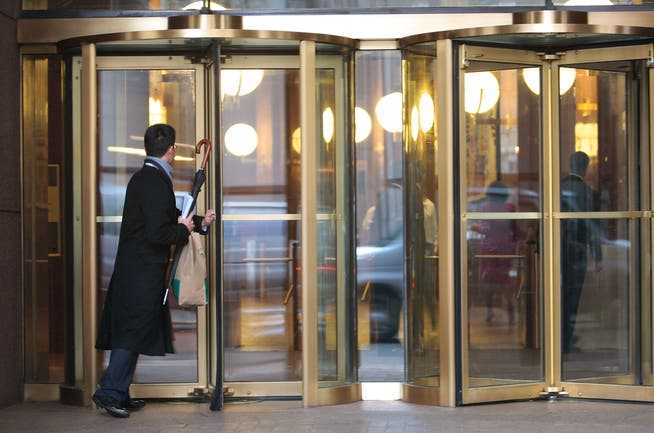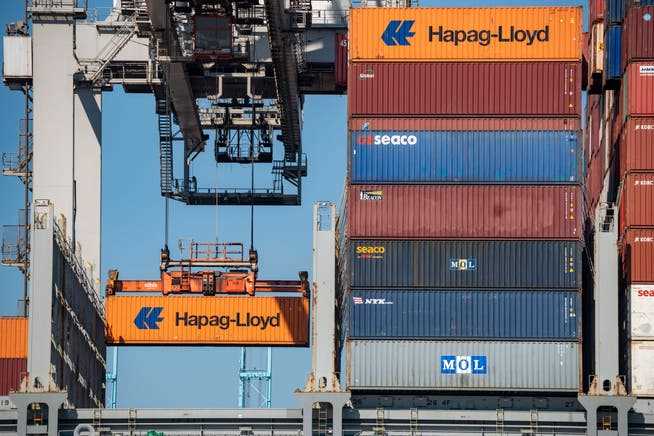Tesla’s profit and sales far better than expected
A Tesla at the opening ceremony of the Tesla factory in Grünheide in March. At the beginning of 2022, the electric car manufacturer set new records for profit and revenue.
(dpa) Despite global supply chain problems and pandemic-related production disruptions in China, the American electric car manufacturer Tesla set new records for profit and revenue at the beginning of the year. In the three months to the end of March, sales increased by 81 percent year-on-year to $18.8 billion, as the group of star entrepreneur Elon Musk announced on Wednesday after the US stock market closed. Tesla earned a bottom line of $ 3.3 billion – that was 658 percent more than a year ago.
The results were significantly better than expected on Wall Street. The stock rose by almost 5 percent in after-hours trading. Although the global auto industry is suffering from persistent shortages of computer chips, for example, Tesla brought 310,048 electric cars to customers in the first quarter – an increase of 68 percent year-on-year and a new record. In March, the group opened its first car plant in Europe near Berlin. Production there, however, has to be really ramped up first.
Tesla did not provide any specific information about the schedule for the Grünheide factory. In the long term, around 500,000 e-cars are to roll off the assembly line there every year, but the company is still a long way from that. In a conference call with analysts and investors, Musk said only that the expansion of production will be supported by a team of experienced employees and that the company has learned a lot from the start of production of the Model Y at its US headquarters in Fremont and in Shanghai. That should now make the process in Berlin and also in the new US car plant in Austin, Texas easier.
Despite the strong numbers, Tesla warned of ongoing difficulties. Global supply chain issues are likely to persist for the remainder of the year. Musk said that component supply inflation is underestimated – some suppliers have increased prices by 20 to 30 percent. In the past quarter, Tesla also suffered from production outages at its car factory in Shanghai due to a Covid lockdown in China. Operations there have now started again, but Tesla has now announced that the situation must be monitored very closely.
Despite these burdens, the group earns more and more. According to calculations by industry expert Ferdinand Dudenhöffer, Tesla is now the world’s most profitable carmaker after the luxury manufacturer Ferrari. In the first quarter, Musk’s company achieved a profit margin of 19.2 percent – the highest margin for automakers that sell more than 15,000 vehicles. “With the new plants in Austin and Berlin and the high profitability, Tesla dominates the car market of tomorrow,” says Dudenhöffer.
Trading in pollution rights, which other car manufacturers need to improve their emissions balance, once again proved to be a lucrative business for the company. In the first quarter, Tesla had a turnover of 679 million dollars – more than twice as much as in the previous quarter. Tesla’s bitcoin holdings have remained flat and were last reported at $1.26 billion. Tesla invested $1.5 billion in Bitcoins last year, but then sold part of it again.
During the analyst call, Musk was also asked about his plans to develop a futuristic-looking “robotaxis” that he recently presented at the Austin plant opening. The Tesla boss promised a product presentation in the coming year, and series production could begin in 2024. The “Robotaxi” will be a “massive growth driver” for Tesla. However, many details of the model remain open. In the past, Musk had suggested that Tesla owners could make their cars available to others as autonomous taxis when they weren’t using them themselves. However, the dates he gave for such a “Tesla Network” passed.
Goldman no longer pays for food

Entrance to Goldman Sachs headquarters in New York.
(Bloomberg) The waning pandemic is reflected not only in Netflix’s stock price, but also in the determination of employers to scale back teasing offers to their employees. Gone are the days of free food at Goldman Sachs. From April 25, breakfast and lunch must be paid for again. Wall Street firms have tried free meals to get workers back to their desks during the home-working boom. Now the investment bank wants to offer a range of other “new experiences and offers”, including snack pop-ups and “Support a Local Restaurant” days. Meanwhile, it shows that bosses are willing to make exceptions when it comes to returning to the office — with themselves. While 35 percent of non-executive employees are in the office five days a week, only 19 percent of executives can say the same about how a survey by the Future Forum revealed.
IBM exceeds expectations with quarterly figures
(dpa) Growth in the software and consulting business has helped the computer group IBM to exceed market expectations. Revenue grew by eight percent in the past quarter to $14.2 billion (around CHF13.5 billion), as IBM announced after the US stock market closed on Tuesday (April 20). Analysts had rather expected $13.85 billion.
Bottom line, continuing operations were in the black at $662 million, down from $403 million on that basis a year earlier. It was the first full quarter after the infrastructure management business was spun off into Kyndryl. In the past quarter, the group also sold the business with applications of its artificial intelligence Watson in the healthcare sector.
The software business grew last quarter by 12.3 percent to $5.8 billion. In the consulting division there was an increase of 13.3 percent to 4.8 billion dollars. IBM shares rose about 2 percent in after-hours trading.
Global economy will grow significantly more slowly in 2022

The Ukraine war is slowing down the economic recovery after the corona pandemic. In the picture: Container loading in the port of Rotterdam.
(dpa)
The International Monetary Fund (IMF) only expects the global economy to grow by 3.6 percent in 2022, which is 0.8 percentage points less than assumed in January. In the forecast presented on Tuesday, the IMF expects growth in the euro zone to be 1.1 percentage points lower at 2.8 percent. In Germany, gross domestic product (GDP) is only expected to increase by 2.1 percent – a downgrading of the January forecast by around 1.7 percentage points.
“The outlook for the global economy has taken a hard hit, largely because of Russia’s invasion of Ukraine,” said IMF chief economist Pierre-Olivier Gourinchas. “This crisis is happening even though the global economy has not yet fully recovered from the pandemic,” he said. Many countries are struggling with high inflation. Disruptions to global supply chains continued – although recent corona lockdowns in China could exacerbate these problems again, he explained. Go to Article
Switzerland is missing its climate target, the industry is on course

Swiss industry meets the climate targets: measurement of a drill at the Mikron factory in Agno.
tsf. Swiss industry is the only sector that has met the previous climate targets. According to a study by the umbrella organization Economiesuisse, industrial companies were able to reduce their emissions by more than 15 percent by 2020 compared to 1990.
The bottom line is that Switzerland’s greenhouse gas inventory for 2020 shows a mixed balance. The reduction target of minus 20 percent compared to 1990 was just missed. According to the Economiesuisse study, it was not possible to achieve sufficient reductions in buildings, transport or agriculture.
However, the trade association points out that Swiss economic output (GDP) has almost tripled in the same period. This shows that economic growth in Switzerland has decoupled itself from emissions. A look at the data also makes energy efficiency clear: for every additional franc of added value, the Swiss economy emits significantly less CO2 than other comparable countries.
The success of the industry is primarily due to clever framework conditions: According to the applicable CO2law, companies can opt out of the CO2-Exempt the levy if you enter into a tailor-made target agreement with the federal government and reduce your emissions with the measures that are ideal for you. Such target agreements are an indispensable model for success on the way to net zero. Every company should be able to decide for itself whether it commits itself to specific, effective measures and whether the CO2– Wanted to be exempt from the levy.
